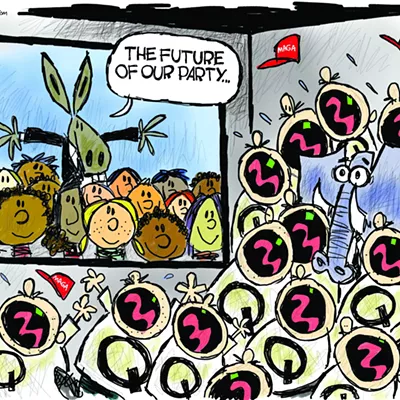We political junkies eat this stuff up. Many of us also enjoy crunching numbers and handicapping races. These days, with vote fraud a growth industry, and our political system inexorably succumbing to the greasy grip of corporations, it's the only way a voter can come out ahead.
Problem is, it's getting harder to gamble on elections. Oh, never mind that story in the daily rag a while back about people getting busted for it. Call it the Pete Rose Principle--don't ever bet on a race that you're involved in!--but so what if I want to guess, for a small price, who's gonna win some Senate race in Ohio? If that's a jailable offense, in light of the massive sleaze that various candidates get away with, then may the Lord Goddess help us all.
Far more problematic to profit-minded prognosticators is the disturbing phenomenon of election results refusing to conform to polls.
My experience sitting up and feverishly refreshing the state of Florida's Web pages deep into Election Night 2000 led me to the hunch that the game was rigged. Thoroughly researched history now confirms this. (On a personal note, if you're one of the Democratic morons who still blames Ralph Nader, of all the 50 felonious reasons we've been stuck with King George the Junior for the last six years, keep your freakin' e-mails to yourself.)
I digress. Fast-forward to 2004. Results in several swing states, including Ohio and Florida, not only diverged from pre-election polls; they diverged significantly from exit polls, which are virtually never wrong, for the simple reason that there is no uncertainty. You're asking people how they voted--past-tense--not how they will vote. Exit polls are the main reason why the media are able to call elections before all the votes are counted, with great precision--until the last few years, anyway.
So why the sudden divergence? In his book Fooled Again, Mark Crispin Miller lays out dozens of different ways the GOP jacked the 2004 vote in Ohio and Florida. But it wasn't just those states. Particularly disturbing is his analysis of absentee/early ballots, exit polls and Election Day results in North Carolina. As seasoned political junkies might expect, there were clear trends across the three data sources. Candidate percentages among early ballots (most of which were submitted just before the election) matched Election Day results, and both closely mirrored exit polls.
This trend held for all races down the ballot--except president and Senate. In those races, there was a sudden, inexplicable swing on Election Day. Like every other statistical anomaly that occurred in 2004, this one favored the GOP. The underdog Republican Senate candidate shocked everyone with an upset win. In the race for president, Bush beat Kerry by six points in the exit polls and early ballots, but magically won by 13 on Election Day, turning a relatively tight race into a no-doubter.
You need only examine the historical record to guess how this occurred. Election watchdog hotlines in North Carolina were flooded with complaints from Kerry voters that the touch-screen machines they had voted with on Election Day had switched their votes to Bush.
In the prognosticating business, hunches and polls are all you really have. In the 2004 election, I successfully played the hunch that, despite polls indicating a Kerry victory, the Republicans would cheat again, since it worked so swimmingly in 2000. The current electoral climate--one of the most unpopular lame-duck presidents in history, sitting on a nasty war and a cauldron of scandal--is a recipe for Republican dicks in a blender.
Here's another bet that the GOP will "find" just enough votes here and there to hold on to at least one, if not both, chambers of Congress. I hope that I'm wrong, that instead, a storm surge of voter disgust overtops the levee of fraud. But if you end up startled by the statistical anomalies of this election, or worried that your vote has disappeared into an electronic machine, I suggest reading Mr. Miller's book.










